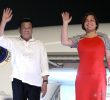
DAVAO CITY, Philippines – Activists staged a demonstration at the Freedom Park in Davao on Thursday, March 2, to protest moves to change or revise the 1987 Constitution.
Protesters, led by progressive groups Bayan Muna-Southern Mindanao and Anakbayan, expressed concern that the changes would extend the terms of politicians and strengthen existing political dynasties.
They also feared that foreign control of the economy would be allowed.
They were against the proposed Charter change (Cha-Cha) that would ease the 1987 Constitution’s economic provisions to allow more Foreign Direct Investments (FDI).
Senator Robinhood Padilla was presiding over a public hearing about the proposed Cha-Cha at the Royal Mandaya Hotel at the same time as the demonstrations.
Protesters warned the proposal could result in contractualization and low wages, and adversely affect employment opportunities.
“Opening the economy will further expand the Marcos-Duterte administration’s power. Globalizing the economy would sacrifice people’s livelihood,” said Anakbayan spokesperson Beverly Gofredo.
The protesters urged the government to focus on an “independent foreign policy and pro-people programs to uplift the nation from worsening economic crisis.”
For the economy’s sake
Responding to the demonstrations, Padilla acknowledged the demonstrators’ views and rights and reassured them that foreign investments would not hurt Filipinos, but strengthen the economy instead.
Padilla said the constitutional process deserved the public’s support since it would be for the welfare of present and future generations of Filipinos.
He also asserted that the Constitution cannot be stagnant and must be updated continuously to meet changing times.
Padilla said regardless of the mode used to amend the Charter – constituent assembly or constitutional convention – what is important is to have a constitution with flexible economic provisions.
Padilla further allayed fears that allowing foreign investments may pave the way for Filipinos to be dominated by foreigners.
“Kapag sinabi nating papayagan natin ng foreigners dito, di ibig sabihin magpapaalipin tayo uli. Di po ganoon, di yan kailan mangyayari pa na papayagan ng Pilipino lalo ng inyong lingkod at mambabatas sa Senado at Kamara. Hindi papayag yan na tayo maging muling alipin ng dayuhan. Pinaguusapan lang natin tayo magbukas ng ekonomiya at pinto upang pumasok capital at pera at ginagawa yan ng lahat ng bansa sa ngayon,” Padilla’s statement read in part.
(When we say we will allow foreign investments, it does not mean we will allow ourselves to be enslaved. That will not happen. I and my fellow lawmakers will not allow it. We will not allow Filipinos to be enslaved by foreigners. What we want is the entry of foreign investments to benefit our economy.)
The proposed Cha-Cha has been a contentious issue for years, with advocates saying it would boost the country’s economy by attracting more foreign investments.
Critics argue that it would lead to the concentration of wealth and power among a few families and politicians. They also warn that allowing foreign control of the economy would have negative consequences for the country’s sovereignty.
The 1987 Constitution, which was ratified after the ouster of dictator Ferdinand E. Marcos, includes provisions that limit foreign ownership.
Despite the opposition, lawmakers continue to push for the Cha-Cha, arguing that it is necessary to attract more foreign investments and stimulate economic growth.
Cost-effective
At the public hearing, Padilla proposed a change in the Constitution’s economic provisions can be done through a Con-Ass method which he saw as cost-effective.
“The amendments are necessary to encourage more direct foreign investments in our country. We have a capital shortage in our economy and our government is in deep debt,” Padilla said in Filipino.
According to the Organization for Economic Cooperation and Development’s (OECD) Foreign Direct Investment (FDI) Regulatory Index for 2020, the Philippines ranked third among 83 economies.
The Bangko Sentral ng Pilipinas has documented a steady decline in FDI inflows from 2017 to 2020.
John Carlo Tria, president of the Davao City Chamber of Commerce Incorporated, said lifting the restrictions would generate more investors in the city, contributing to a stable and strong economy.
He said four focus areas of business in the region – agro-processing, manufacturing, logistics, and marketing – will flourish if more investors and interests are generated with the lifting of restrictive provisions.
Con-Con vs Con-Ass
Lawyer Eula Pertugos-Arias, a resource person from Jose Maria College, said the Con-Con method would ensure people’s participation in the process.
“We should opt for a constitutional convention because we will have the participation of the people whereas in a constituent assembly, (it) would just be Congress,” she said.
Padilla said the costs were factors that needed to be considered
The National Economic and Development Authority (NEDA) said a Con-Con would incur an estimated expense of P28 billion, but it can be reduced to P14 billion if a plebiscite is held simultaneously with the elections.
President Ferdinand Marcos Jr. has said changing or revising the Constitution is not a priority of his administration.
The 1987 Constitution was written after the 1986 People Power Revolution that toppled the first Marcos dictatorship and sent the Marcoses into exile.
The present Constitution contains provisions that restrict the martial law powers of the executive and imposed term limits for elected officials with the president and vice president serving only for a single six-year term. (originally posted on rappler.com)
Lucelle Bonzo is an Aries Rufo Journalism fellow.
1987 constitution, charter change, philippines









